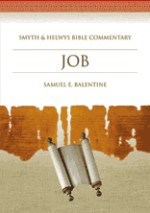Samuel Balentine is the Old Testament General Editor for the Smyth & Helwys Bible Commentary Series. He is a Professor of Old Testament at Union Theological Seminary and Presbyterian School of Christian Education.
714 pages
Table of Contents:
Introduction
Prologue: Life in the “Garden of Uz” Job 1–2
Job’s Assault on Creation, Job 3
The First Cycle: God’s Moral Governance of the World Job 4:1–14:22
1. Eliphaz’s First Response to Job: “Think Now, Who That Was Innocent Ever Perished?” Job 4–5
2. Job’s Response to Eliphaz: “I Will Speak in the Anguish of My Spirit” Job 6–7
3. Bildad’s First Response to Job: “Does God Pervert Justice?” Job 8
4. Job’s Response to Bildad: The Imperative and the Impossibility of Putting God on Trial, Job 9–10
5. Zophar’s First Response to Job: “Can You Find Out the Deep Things of God?” Job 11
6. Job’s Response to Zophar: “I Desire to Argue My Case with God” Job 12–14
The Second Cycle: The Place of the Wicked in a Moral World Job 15:1–21:34
1. Eliphaz’s Second Response to Job: The Fate of Those Who “Bid defiance to the Almighty” Job 15
2. Job’s Response to Eliphaz: Portrait of God as Enemy, Job 16–17
3. Bildad’s Second Response to Job: Should the Moral Order of the Universe Be Forsaken on Your Account? Job 18
4. Job’s Response to Bildad: “Know Then That God Has Put Me in the Wrong”
Job 19
5. Zophar’s Second Response to Job: The Fate of the Wicked “Ever Since Mortals Were Placed on the Earth” Job 20
6. Job’s Response to Zophar: The Truth About the Fate of the Wicked in the Moral Order of the World, Job 21
The Third Cycle: The Dialogue Breaks Down Job 22:1–27:23
1. Eliphaz’s Third Response to Job: “Can a Mortal Be of Use to God?” Job 22
2. Job’s Response to Eliphaz: God Is Absent and Evil Runs Amok, Job 23–24
3. Bildad’s Third Speech and Job’s Response: Dominion, Fear, and a Whisper of Something More, Job 25–26
4. Job Again: “May My Enemy Be Like the Wicked” Job 27
A Second Soliloquy: “Where Shall Wisdom Be Found?” Job 28
1. Job’s Summation and Decision to Move Beyond Blessing and Cursing,
Job 29–31
2. Past Blessings, Job 29
3. Present Misery, Job 30
4. Job’s Declaration of Innocence, Job 31
The Speeches of Elihu: Job 32–37
1. The Introduction of Elihu, the “Answerer” Job 32
2. The Meaning of Suffering, Job 33
3. God’s Just Governance of the World, Job 34
4. God’s Detached Justice, Job 35
5. Elihu’s World, Job 36–37
God’s Answer from the Whirlwind and Job’s Response (Overview)
Job 38:1–42:6
God’s First Answer, Job’s First Response Job 38:1–40:5
God’s Second Answer, Job’s Second Response Job 40:6–42:6
Epilogue: “As My Servant Job Has Done” Job 42:7-17
bibliography
index of Modern Authors
index of Sidebars
index of Scriptures
index of Topics
Reviews
Rarely does one find a biblical commentary that is scholarly, in-depth, insightful, theological, and relevant. Balentine's work on Job is a masterpiece!-- J. Randall O'Brien, Executive Vice President and Provost,Baylor University
Balentine rises to the challenge of the book of Job in this rich exegetical and theological probing of its mysteries. As good as it gets as a commentary, however, this treatment of Job stands out all the more because of its marvelous collection of literary and artistic representations of the book and the themes with which it deals. The Book of Job must have been created for this kind of commentary – or vice versa! -- Patrick D. Miller, Princeton Theological Seminary
If God's question to the Adversary, "Have you considered my servant Job?" were put to Samuel E. Balentine, modesty would prevent him from saying more than, "I have." Readers of this richly illustrated commentary, Job, however, will soon recognize that he has thought profoundly, written elegantly, and empathized fully with that object of a gratuitous divine test. --James L. Crenshaw, Robert L. Flowers Professor of Old Testament, Duke University
Sam Balentine has written a breath-taking commentary on the Book of Job that is sure to be the beginning point of all subsequent Job study. His writing will compel exegetes to pay attention; more than that, it will occupy pastors and theologians with the complexity of articulating the “final truth” about God, and will be an authoritative voice in the great conversation among us concerning our contemporary moral crisis.
Balentine is a first rate exegete. But then, after he reads the text, he moves out in bold and daring ways to make fresh connections. He has digested every commentary, remembered every poem, taken into account of every artistic portrayal. There is not a page of this commentary on which I was not led, in generative ways, to where I had not previously been. I cannot imagine a reader who will not find it to be so. Balentine’s work is a demanding assurance that the “thickness” of humanity is still available in a way that refuses glib characterization. In this remarkable commentary series, Balentine has set a new standard of excellence…of artistic sensibility and of hard-nosed, faithful reading. As I have already said, “breath taking”! --Walter Brueggemann, Columbia Theological
Samuel Balentine, one of our most sophisticated interpreters of the Old Testament, gives us a fresh and lucid theological reading of the book of Job. Gathering a remarkable array of resources from the wide worlds of art and literature that have been generated by Job, Balentine sensitively weaves this material into his own creative interpretation of the book. Speaking a post-9/11 world which has been confronted anew with the reality of suffering and the problem of evil, Balentine's insightful and accessible commentary will benefit readers in both church and academy. --Terence E. Fretheim, Luther Seminary
ISBN: 9781573120678
Catalogue code: N/A
Publisher: SMYTH & HELWYS PUBLISHING - published N/A
Format: Hardback

